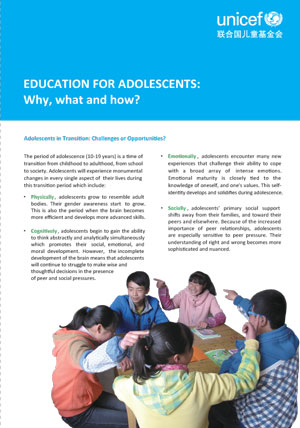The period of adolescence (10-19 years) is a time of transition from childhood to adulthood, from school to society. Adolescents will experience monumental changes in every single aspect of their lives during this transition period which include:
Physically, adolescents grow to resemble adult bodies. Their gender awareness start to grow. This is also the period when the brain becomes more efficient and develops more advanced skills.
Cognitively, adolescents begin to gain the ability to think abstractly and analytically simultaneously which promotes their social, emotional, and moral development. However, the incomplete development of the brain means that adolescents
will continue to struggle to make wise and thoughtful decisions in the presence of peer and social pressures.
Emotionally, adolescents encounter many new experiences that challenge their ability to cope with a broad array of intense emotions. Emotional maturity is closely tie d to the knowledge of oneself, and one's values. This self-i dentity
develops and solidifies during adolescence.
Socially, adolescents' primary social support shifts away from their families, and toward their peers and elsewhere. Because of the increased importance of peer relationships, adolescents are especially sensitive to peer pressure. Their understanding of right and wrong becomes more sophisticated and nuanced.
How to do it?
1. Build trust and partnership with central and local government.
2. Build capacity of counterparts by providing technical inputs with leading national experts.
3. Build positive environment through influencing key stakeholders and the public.
4. Build models together with government to allow scaling up to ensure sustainability.
Download File:
EDUCATION FOR ADOLESCENTS: Why, what and how?





























